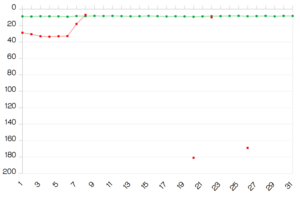10 Best Private Email Services in 2024
When looking to create a secure email address, check this guide to find the best free private email provider for personal and business use!

Email - one of the most used communication tools to date - is also insecure and oftentimes not private. Today most of us spend hours online and our email accounts become our prime digital identity with lots of services like Amazon, PayPal, Twitter and more linked to our email address. This makes our email the most important target for hackers, which raises an important question: Are emails private?
If you use one of the big tech services that are known for their free email accounts like Gmail, Outlook or YMail, then the answer is: no. While they are still the most used providers for personal email, Gmail and Co can scan all your information and use it to create a profile about you and your online usage. When using big tech services that do not use built-in encryption, your email account is vulnerable to tracking, phishing and other cybersecurity attacks. Google, Microsoft and Yahoo Mail are definitely not the most secure email providers. While they pose as being free, easy to use and popular – they are not in fact free at all! You pay with your data and loss of privacy. They are also known for quickly obliging to government requests and can hand out your entire inbox. Plus, any data that's not end-to-end encrypted is vulnerable to data breaches and hacking attacks.
Fortunately, more secure email alternatives exist! To keep your personal details safe, it’s time to switch to an email provider that truly keeps your emails confidential and protects your private data!
But before we evaluate the top ten, let's look at what your email service of choice must be able to achieve.
Factors for choosing the best secure email
Before deciding on the best email service for your needs, it's important to not just look at features, but also at important factors that influence the service's security and privacy.
Privacy: How does the email provider protect your privacy? What does its privacy policy say on data collection, anonymization of data, and deletion of data.
Security: How does the provider achieve best security? What standards and policies does it have in place?
Encryption: Does the email service use end-to-end encryption or only TLS? What data is encrypted end-to-end like subject lines, attachments, contacts, and calendars?
Jurisdiction: Where is the provider based, where are the servers located, and how does this influence your privacy?
Open Source: Is the code of the service published as open source so that third parties can check the code and the encryption?
Email apps: Does the service offer its own encrypted email app on all platforms, Android, iOS, Windows, macOS, Linux?
Which Email Service Is Best for Privacy?
With numerous free email services available, it can be challenging to choose the best one. To decide which email is the most private, we explore ten of the best encrypted and secure email services - most of them are free. The top private email services – whether free or paid – must offer robust encryption, privacy-focused features, and reliable platforms for your email needs on Android, iOS, Windows, macOS and Linux.
Let's find out which provider is best to create a free email address with!

Summary: The 10 Most Secure Email Providers in 2024
Your emails are not as private as you believe, particularly if you are using one of these email platforms: Gmail, Outlook (formerly Hotmail), Yahoo Mail, or GMX. These free email providers are known for scanning your entire mailbox to create a profile on you and post targeted ads. To achieve optimal privacy, it's time to delete your Yahoo or Outlook account. If you still have a free Gmail account, you should truly consider deleting your Gmail. Google’s Gmail has a massive scope into your private life, one that’s quite hard to imagine – they go so far as to track everything you ever bought via email receipts received in your Googlemail inbox.
Now is the time to back your data with encrypted email providers! These services are also free, some operate on a subscription based model, but the best of all: by using encrypted email no third party can read your emails; they stay absolutely private and confidential!
Use this list of the 10 best private email providers to jump to a detailed review of each service to see whether they fit your needs and whether they are best for personal or business use.
No. 1 Tuta Mail: Best for strong encryption
No. 2 Proton Mail: Popular private email service, based in Switzerland
No. 3 Mailfence: Secure email, located in Belgium
No. 4 Mailbox.org: Paid secure email made in Germany
No. 5 Zoho Mail: Email and office suit for businesses
No. 6 Posteo: Paid anonymous email for personal use
No. 7 Hushmail: Private email for healthcare and law professionals
No. 8 Thexyz: Email and custom domain hosting in Canada
No. 9 Private-Mail: Web-based business email hosting solution
No. 10: Librem Mail: Private email built by the team of Purism
Conclusion: Create the Best Account For Free
Many of these private email providers are freemium or paid services. If you are looking for the best free email account check out this comparison.
Review of the 10 best secure, encrypted and private email providers
No. 1 Tuta Mail

Tuta is private email by default with a clear focus on encryption and zero user tracking.
Tuta Mail is free, easy-to-use, fast and encrypts the most data. It uses zero Google integrations & has unlimited custom domain email addresses. Tuta is also the only private email service that lets you register with a four-letter com domain: tuta - com.
Sign up now for your free email account.
Tuta (formerly Tutanota) was launched 2014 in Germany with a dedicated mission to promote privacy worldwide. The team’s commitment to put privacy first has influenced strategic decisions that involve extensive efforts, such as building a Google-independent push notification system for Android instead – while other private email providers rely on Google Push.
In the long term, this strategy yields significant benefits. Tuta Mail has gained widespread recognition as the leading secure email service that prioritizes privacy, eliminates tracking, and encrypts the most data. For instance, Tuta Mail goes beyond encrypting just email content and attachments, but also email subject lines and calendar event reminders. This unparalleled level of security sets the confidential email service apart from competitors, underlining its reputation as pioneers in the field of encryption. To future-proof the security of Tuta Mail, the team is already working on post-quantum encryption. This will protect any data stored in Tuta from attacks by quantum computers; another quantum leap in terms of safety!
As stated in the privacy policy, Tuta Mail truly prioritizes the protection of your privacy and security, and never takes shortcuts in development or prioritizes profits if it meant compromising privacy or security aspects. Furthermore, as an independent team, the development of Tuta is not influenced by external investors or shareholders.
At Tuta, the objective is to ensure that security and privacy are accessible to everyone. This is why the encryption process is seamlessly integrated into the email clients and takes place in the background, enabling you to utilize Tuta with the same ease as any other email service. All internal emails in Tuta Mail are automatically encrypted end-to-end. When sending to an external recipient, for instance to Gmail, you can secure the email with a shared password to apply end-to-end encryption. These password-protected emails make sure that you can communicate confidentially with anyone. The recipient can not only access your latest message (like with other providers that offer password-encrypted emails), but the entire email thread, which makes it super convenient.
The Tuta email apps on iOS and Android ask for very few permissions to keep your level of privacy to a maximum. Every component of the email clients have been 100% open source since first launch. With Tuta Mail, you can create your email address without a phone number or any other personal information; there's no logging and you can check your sessions for shady login attempts. This way you can make sure that your email address is fully private and anonymous.
Tuta owns its servers and infrastructure which are powered with 100% renewable electricity.
Fully encrypted Tuta accounts can be decrypted by entering your password upon login which is as easy as any other sign in. Login credentials can optionally be secured with two-factor authentication via TOTP or U2F hardware keys. Tuta Mail is available from any browser, or via its open source mobile apps for Android and iOS or open source desktop clients for Linux, Windows and macOS.
The free account offers 1 GB of storage while the cheapest paid plan has 20 GB for 3 euros per month. Tuta Mail offers excellent value for both free email accounts and paid subscriptions, providing a wide range of features at no cost and the most affordable pricing for premium plans. With a free account, you can enjoy numerous features, while the paid subscriptions offer even more benefits, including custom domain support, unlimited email addresses with your own domain, unlimited inbox rules, unlimited fully encrypted calendars and an option for a whitelabel version to brand Tuta in your company’s design. The last feature is particularly of interest to companies looking for private business email that is easy to use and give it a professional look.
All of these facts make Tuta one of the best private email and calendar services.
Create a secure email account now.
Pros
- Encrypts the most data
- Easiest way to send encrypted messages to anyone
- All clients are open source
- 100% sustainable electricity
- Clients for all major operating systems
- No IP logging
- Clean & simple design
- Own servers based in Germany with strong data protection (GDPR)
- Anonymous payment with Bitcoin & Monero
Cons
- No cloud storage yet
- No integrations with enterprise tools
No. 2 Proton Mail
 Source: Proton website
Source: Proton website
ProtonMail is another secure email service that focuses on privacy, although among the providers presented here one of the most expensive and most limited in the free version. ProtonMail's Swiss-based servers, just like Tuta's servers in Germany, are protected by strict privacy laws. Although Proton does have secondary offices in the US, one of the Five Eyes countries.
Like Tuta Mail, Proton Mail uses end-to-end encryption for all emails, and enables users to send password-protected emails to recipients that don’t have an address registered with an encrypted email provider. One major differentiation is that in Tuta external recipients can access the entire email thread via the shared password while recipients of encrypted messages from Proton are limited to just seeing one message per login.
ProtonMail uses PGP encryption, which lacks important requirements that Tuta Mail is able to fix. Tuta Mail encrypts not just bodies and attachments of emails, but also the subject line, which can contain very sensitive information. Additionally, the encryption protocols used in Tuta Mail makes it possible to upgrade to new algorithms for post-quantum security and add support for Prefect Forward Secrecy.
Tuta and ProtonMail both prioritize user security and privacy over profits, unlike older generation email services like Gmail and Outlook. However Proton Mail leaks confidential information to Google, for instance by using Google’s Push Notification Service. People choose to create email addresses with Tuta and Proton to enhance their privacy and get rid of Big Tech.
If you ask yourself whether ProtonMail is more private than Gmail, then the answer is yes. Compared to Gmail ProtonMail is a solid private email alternative.
ProtonMail also offers open source mobile clients which means that anyone can inspect the code and ensure there are no backdoors, but Proton does not have its own desktop email clients for Linux, macOS and Windows. Instead, Proton has built a so called "bridge" only available to paying users. However, this bridge is not the most secure solution, because when in use all data is stored unencrypted in a third party email client like Outlook or Thunderbird.
Additionally, IMAP and SMTP are not the most efficient protocols especially when it comes to push notifications or to attachments of emails (which are encoded into the email body).
ProtonMail Free comes with 500 MB of storage (can be increased to 1 GB) and the cheapest paid plan has 15 GB of storage and costs 3.99€/month. ProtonMail business plans also include a subscription to ProtonVPN and the company also has a cloud storage solution, ProtonDrive, in addition to its private email offering.
Check here a more detailed review on how ProtonMail compares to Gmail.
Pros
- Encrypted messages to anyone
- Self-destruct emails
- Cloud storage
- Password manager, Drive and VPN (paid))
- "Bridge" for users who value convenience over security (paid)
Cons
- Free version comes with major limitations
- Using a "bridge" means a decrease in security
- If VPN and email comes from the same company, the email provider can see your real IP
- Not the most advanced encryption protocols
- Proton uses Google’s Push Notification Service
No. 3 Mailfence
 Source: Mailfence website
Source: Mailfence website
Mailfence is a privacy-oriented email service with contacts, calendar, documents, and secure online collaboration. It is based in Belgium, and like Germany where Tuta is based all requests for user data requires must go through a court. The encrypted email service aims at privacy-conscious individuals and businesses, but is less popular than Proton and Tuta.
Mailfence relies on OpenPGP for its email encryption, similar to Proton, which is the most widely used email encryption standard, but lacks important security features like encrypting the subject line and Perfect Forward Secrecy – issues that Tuta is tackling with its encryption implementation. When using end-to-end encryption, people can be sure that nobody can read their private correspondence. Mailfence offers web-based email, but it also has mobile apps, though the Android app has only been installed by 500+ users.
The free plan comes with 500 MB of email storage and 500 MB of file storage while the cheapest paid plan costs 3.50€ per month and includes 10 GB of email and 30 GB of file storage. Mailfence supports two-factor authentication (2FA) (though hardware keys like U2F – the most secure way for 2FA are not supported), custom email domains as well as POP, SMTP, and IMAP access.
Pros
- Offers OpenPGP encryption
- Data is stored in the EU with strong GDPR protection
- Messages, Documents, Calendar, Contacts, and Groups
- Supports self-destructing emails (password-protected)
Cons
- Logging of IP addresses and some other data (not all data is encrypted)
- Is not open source
- Does not support U2F hardware keys for two-factor authentication
No. 4 Mailbox.org
 Source: Mailbox website
Source: Mailbox website
Mailbox.org is a secure email service from Germany that aims at keeping your conversations confidential. Mailbox says on its website it is "secure e-mail for private and business customers”, offering secure email as well as online office, cloud storage, video conferencing and other productivity tools like spreadsheets and presentations.
Mailbox wants to offer top-notch security in a convenient manner and for that has implemented PGP encryption that is easier to use than when you set up PGP yourself in the Thunderbird or Outlook desktop client. When emails are encrypted with PGP, only you hold the privacy key so that no one – not even the email provider – can view your emails. This prevents man-in-the-middle attacks. Like other private email services, Mailbox removes IP addresses from emails sent and logs as little information as possible.
Mailbox does not have its own apps, but supports Pop and IMAP so that you can use it in third-party clients and apps.
Like many other secure email providers, Mailbox uses third-party tech like Dovecot, Roundcube and others to build their own products. Every time a so called secure service uses third-party applications, it becomes more difficult to secure the service. The reason is simple: Every service included in the code executes code. Any services' security can't get better than that of its dependencies. Every dependency to third party code must be maintained and security updates need to be applied immediately. In addition, every third-party service can potentially track the users, send data to its own servers etc. Tuta, on the other hand, only uses open sourced services and checks the code for security vulnerabilities.
Mailbox does not have a free plan, but offers three paid plans: Light for 1 euro/month with 2 GB storage; this plan does not offer custom domains for individuals. Standard for 3 euros/month with 10 GB of mail and 5 GB of cloud storage and Premium for 9 euros/month with 25 GB of mail and 50 GB of cloud storage.
Pros
- Offers easy-to-use PGP encryption
- Located in Germany with strong GDPR protection
- Emails, calendar, address book, cloud storage, video conferencing
Cons
- No mobile apps
- No control of tech stack
No. 5 Zoho Mail
 Source: Zoho website
Source: Zoho website
Zoho Mail is a reliable email service with a focus on business users and more advanced security and privacy features than Gmail our Outlook, but lagging behind Tuta and Proton in this respect.
ZohoMail's integration with other Zoho products, such as Zoho Docs and Zoho CRM, and a wide range of enterprise tools, make it a comprehensive solution for businesses.
Zoho’s applications are closed-source and rely on integrations with closed-source third-party tools that don’t prioritize your privacy and security. Being closed source means that no one can check whether the code is actually doing what Zoho promises; thus, a backdoor could be included in the code without anyone noticing.
Zoho’s data centers are distributed across the US, Europe, China, India and Australia, which makes it available to some of the worst surveillance programs in the world.
In terms of encryption protocols, Zoho encrypts your emails at rest but does not encrypt all your data end-to-end. Zoho Mail uses TLS for all communications from POP/IMAP/SMTP clients to their servers. For an optional end-to-end encryption of messages Zoho uses S/MIME. In May 2018, the Electronic Frontier Foundation (EFF) announced critical vulnerabilities in S/MIME, together with an obsolete form of OpenPGP that is still used in many email clients. Dubbed EFAIL, the vulnerability required significant coordinated effort by many email client vendors to fix this vulnerability. However, to date, it is not clear whether all email services actually did fix the vulnerability.
ZohoMail offers the option to use standard mail clients via IMAP/Pop (except with their free accounts), but emails stored in these mail clients would be stored in plain text (unless you encrypt your local hard drive yourself).
Zoho starts with Mail Lite at 0,90 euros/month with 5 GB of storage, then is offers Mail Premium for 3,60 euros/month with 50 GB of storage as well as business plans for professional email use.
ZohoMail doesn't have security measures like a no-log policy and uses a third-party captcha. Thus, it can not be considered as truly private.
Pros
- Integrations with Zoho business tools as well as with third-party enterprise tools
- IMAP / POP access for users who value convenience over security
- Cloud storage
Cons
- Does not encrypt everything
- Security features are not as advanced as those of privacy-first providers
- Doesn't use a zero-knowledge architecture
- Operates within Five Eyes jurisdiction
No. 6 Posteo
 Source: Posteo website
Source: Posteo website
Posteo says it is green, private email. The service from Germany does no offer custom domains as it wants its users to remain anonymous. That’s also why Posteo allows people to pay with cash as it does not have free accounts.
Posteo enables users to encrypt their mailbox easily, but it does not automatically encrypt emails.
Posteo is a basic email service aimed at individuals who can get a posteo email address with 2 GB of storage for 1 euro per month. It is a solid choice for personal use.
Pros
- Simple email account for individuals
- Encrypts the entire mailbox
- Anonymous payment with cash
Cons
- No end-to-end encrypted emails
- No custom domain support
No. 7 Hushmail
 Source: Hushmail website
Source: Hushmail website
Hushmail is a Canada-based secure email service that used to be quite popular among healthcare and law professionals for keeping digital conversations confidential. However, the service is no longer innovating in the security sphere and hence has lost market share in recent years.
Hushmail is a good choice for professional use if HIPAA-compliance is required.
Pros
- Private email account for individuals and companies
- Encrypted emails are possible
- HIPAA-compliant
Cons
- Based in Canada, a Five Eyes Country
- Not popular among private users
No. 8 Thexyz
 Source: The XYZ website
Source: The XYZ website
Thexyz is another Canada-based email provider. In addition to private email, it also lets you register your own domain. This way you do not need to purchase a custom domain from a different domain provider than your email hosting service. Like other encrypted email services, Thexyz uses open-source encryption standards like AES and OpenPGP and offers two-factor authentication as well as advanced spam filtering. However advanced spam filtering costs an extra of 24.95 USD per domain for six months. The service allows you to create +-addresses as well as email alias addresses.
The starter price for is 2.92 USD per month for 25 GB of mailbox storage.
Pros
- Good encryption with PGP and 2FA
- Advanced spam filtering
Cons
- Based in Canada, a Five Eyes Country
- No free plan
No. 9 Private-Mail
 Source: Private-Mail website
Source: Private-Mail website
Private-Mail is an email service powered by Open Exchange, the self-called “leader in open email platforms”. The goal of Private-Mail is to offer a simple and secure web-based email hosting wrapped in a fast, lightweight interface. The service also includes contacts and calendars in all plans, and has a 60 day trial period for free.
Private-Mail encrypts your emails with PGP to protect them from prying eyes.
Pros
- Good encryption with PGP to keep your email safe
Cons
- Located in the USA, a Five Eyes Country
- No free plan
No. 10 Librem Mail
 Source: Librem Mail website
Source: Librem Mail website
Librem Mail is a private email service that focuses on open source. When using PureOS by the Purism team you can set up your Librem Mail account in an email client like Thunderbird. The email address will end in @librem.one.
Like other private email solutions Librem Mail uses OpenPGP for seamless email encryption. All of Librem’s apps are open source, but the Librem Mail Android app has not seen an update since 2020 in the Google Play Store. The Purism team also offers Librem Chat for encrypted chat and calls, Librem Social and Librem Tunnel. Additionally they offer a VPN service to enable private browsing.
The suit consisting of mail, chat, social and VPN costs USD 7.99 per month for personal use or USD 14.99 per month for family usage.
Pros
- Good encryption with PGP
- Offers a suite of encrypted services (Mail, Chat, Social & VPN)
Cons
- Based in the US, a Five Eyes Nation
- You need to use PureOS
What Is Private Email?
Private email providers focus on your security and privacy. They use encryption so that only you and your recipients can see your confidential messages, no one else can read your secure emails. The providers do not track you, have strict privacy policies and do not show advertisements.
Being private does not mean being anonymous, which includes hiding your identity. But many private email providers also offer protecting your identity.
Is Gmail Private?
 You already know that Gmail is not private, but what's the best free email alternative?
You already know that Gmail is not private, but what's the best free email alternative?
If you’ve been using Gmail, your emails are not private. More steps are needed to keep your email truly confidential: **end-to-end encryption, no-log policies of IP addresses, signing-up without a phone number, and no loading of external content are just some must-have features for private email providers.
While Gmail does offer to send confidential emails that are password-protected, you must not be fooled by Gmail's promise for confidential emails: The big tech giant still has full access to all your messages - even the confidential ones.
More and more people and businesses consider data privacy and security a basic necessity, no longer just a nice-to-have. Microsoft, Google and Apple offer email services that are so widely used and have been on the market for so long, that many people consider them the “default” email services. But security experts have been warning about the risks of using these legacy services that were never meant to prioritize your security or privacy.
As people become aware of the risks associated with using big tech email programs, the demand for secure and private alternatives is on the rise. Companies also start looking for private business email solutions that offer automatic encryption for maximum security. Out of all the companies currently offering private email alternatives to Big Tech, Proton Mail and Tuta Mail stand out from the crowd.
Conclusion: Create the Best Account For Free
When it comes to confidential email providers, TutaMail leads the field with maximum encryption, zero tracking and zero Google integrations. You can create a private email account within seconds and without giving away your phone number; Tuta is easy-to-use and beginner friendly. ProtonMail is a close follow-up, but does use Google integrations, which is a clear sign that privacy is not the ultimate priority for the Proton team and its strategical decisions.
Both Tuta and Proton allow you to send encrypted messages to anyone, but with Tuta's system being better thought out as the external recipient can access the entire message thread with one login while Proton’s recipients will always only see one message per login. Both offer mobile apps for Android and iPhones which makes the encrypted mailbox accessible wherever you are.
The other reviewed services like Mailfence, Mailbox, Zoho Mail, Posteo, Hushmail, Thexyz, Private-Mail, and Librem Mail are also okay when it comes to protecting your privacy, but lack either in encryption (only parts of the data is encrypted), or are based in one of the Five Eyes nations.
Tuta's end-to-end encryption and user-friendly apps make it an excellent choice for individuals and businesses alike who are looking for a new, private email address.
If you're looking for more in-depth information, check out our detailed email comparison section to help you choose the service that aligns best with your personal needs and priorities for private email.
Remember it's critical to protect your online privacy and data security by opting for a private email service. By creating an email address with the best private email service, you can enjoy secure and confidential communication conveniently from the device of your choice, be it Android, your iPhone, or your PC with Windows, macOS or Linux!
Gone are the days of email scanning, and peeping about your mailbox.

No comments available










